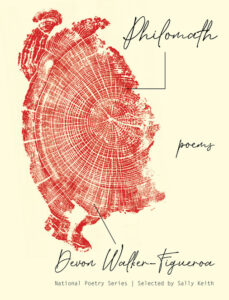At 7, I learned the logic of cedars—
their relentless failure
to live, the frail
flame they leave for you
to cut down & to curse.
The locals called the new
condition rust. “It’ll open up
our view of Mary’s Peak,”
they said. My father blamed his blood
brother, brother
who’d bought up all
the land around our land,
who, as a boy, delighted
in harvesting
wings from flies. Funny
to think of a thing named
for what it cannot do. I’ve never spoken
to the man, though I know
he’s mastered
11 tongues & runs a language
school near Okinawa. “Once,
he bragged about hiding
cameras in the showers
of that school,” my father
says in trying
moments, as I try to appear lost
in thought. I suspect
the blood brother can carry
a captivating conversation
in the language I am
trying to learn, language
of a branch that lets you
express the thought “I hear
heat” or “I taste
heat,” which makes “to feel”
end up feeling a touch
inadequate. “Blood is
thicker than water”
is a saying my mother
despised when she was
running our house like an inn
for the insane. She loved nearly
any animal that wasn’t
cut out for living—like
orphaned fawns & withdrawn
addicts she’d find
trembling at rest
stops along Route 20, like cedar
waxwings that mistook glass
for the space that lives
behind glass. Under the last
incense-cedar in the back
yard, we had a whole
boneyard of birds—
Toby, Thelma, Obadiah. We didn’t know
their sex. We didn’t know
why they camped all winter
long when they had bodies
that could carry them
some place warm & somehow full
of promise. Mti means
tree & mtu is person
in the tongue I try to hold
as if it were mine. In the tongue
I was born to, I was to be called
Forest, but then I wasn’t born
a boy & you can guess
the rest of the story. Everyone wanted
a brother for my sister.
I wanted a brother for all
of time, but my parents’
tepid tries ended
in prematurity & my mother
believed these losses due
to the blood brother standing
beside the driveway, cursing
her, screaming
whore every time she’d open
the gate. At the time,
I didn’t really know
what whore meant, nor
that it used to be a homophone
to hour, a fact not lost
on Elizabethans. Also not lost
on Elizabethans was the value of public
dissection, a theater
of which my father would be
fond. I say fond, given his love
of forensic science
shows, in which crimes get duly
accounted for while we feast
our eyes. “Do you see that?”
he once asked over dinner, pointing
his fork at the screen
over which flashed the image
of a lone limb (feminine,
etiolating on a Floridian
beach), “the hair keeps growing
after death!” My middle name is
Elizabeth, which means “My God
is an Oath.” So is my mother’s.
Was. So was her mother’s
mother’s & such is my book
of #s, so full of aimless begats.
According to Psalm 92,
the righteous shall flourish
like a cedar of Lebanon. I always
assumed the word
shall meant in my lifetime, that is,
when my life was a rehearsal
for eternity. The infected
fronds of a cedar smell
sweet when July touches
them, so sweet you swear
they can’t be dying now
or ever, though you know
their fall is ripening
underfoot. The root
—ake means both his & hers
in the language
I am trying to learn, meaning
perhaps an object is altered
little by the hand that holds
it, by the many aching parts
attached to the hand & to
its holding. The blood brother had
at some point promised
to have & to hold & had
2 daughters whose names escape
me, but end in
—ko, with whom I’m not
friends & might
never be, though I hear
they make art & suspect
they are kind. In Drain,
Oregon, in the last summer
of the cedars’ lives, I found a kind
of kinship at Son Shine
Camp & climbed high up
on a cross in the middle of a dying
forest. You could smell
the orange needles as they fell
lightly at your feet as false
eyelashes. You could feel
sunshine seeping
through trees that couldn’t feed
on light or water
anymore. In the game, my # was
called, meaning I was to be
crucified, & a boy
I wouldn’t exactly call
my neighbor squeezed
a ketchup bottle
in both hands & whispered, “Don’t
forget to shout forgive them,
Father, ’cause they don’t know
what they’re doing & don’t
worry, Dee. It’ll be so quick & just
like getting your blood
drawn.” I said, “I won’t forget.”
__________________________________

Excerpted from Philomath by Devon Walker-Figueroa (Minneapolis: Milkweed Editions, 2021). Copyright © 2021 by Devon Walker-Figueroa. Reprinted with permission from Milkweed Editions. milkweed.org



